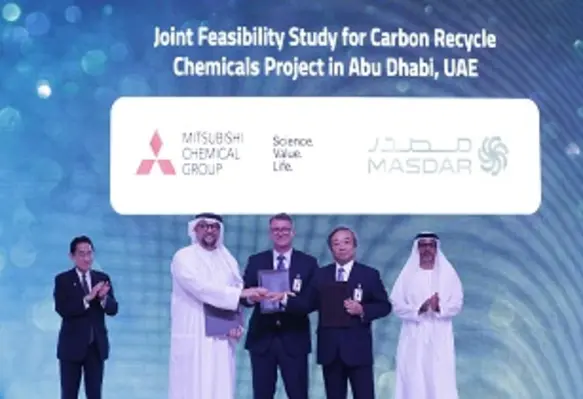Masdar, Mitsubishi Chemical Group Corporation (MCG) and INPEX CORPORATION have signed an agreement to explore production of the world’s first commercial-scale polypropylene made from CO2 and green hydrogen in Abu Dhabi
The green hydrogen and CO2 will be converted to e-methanol which will subsequently be converted to propylene and polypropylene. The aim is to support hard to abate sectors including the maritime sector and industries to reduce their carbon footprints.
The agreement was announced during the Japan-UAE Business Forum, in Abu Dhabi, attended by HH Sheikh Hamed bin Zayed Al Nahyan, Member of the Abu Dhabi Executive Council, and Japan’s Prime Minister, HE Fumio Kishida. The three companies will investigate the techno-economic feasibility of a commercial-scale green hydrogen to e-methanol and polypropylene project.
Masdar’s CEO, Mohamed Jameel Al Ramahi, said, “We are very excited to be partnering with flagship Japanese companies, Mitsubishi Chemical Group and INPEX. Today’s agreement will enable us to join forces and further unlock the potential of green hydrogen to drive industry and growth while reducing emissions.”
Mitsubishi Chemical Group CEO, Jean-Marc Gilson, said, “The chemical industry is now faced with the dual challenge of reducing its GHG emissions, while actively participating and leading the transition to a carbon neutral economy. With that focus in mind, our ambition to use CO2 as a key starting raw material is a very important stepping stone towards a sustainable future, and we are looking forward to using our expertise to contribute to the success of this project.”
INPEX president & CEO, Takayuki Ueda, said, “This initiative is fully aligned with our decarbonisation efforts as well as our long-term commitment to Abu Dhabi, which is one of our core business areas. We hope to leverage this opportunity to enhance our clean energy solutions and help realise a net-zero society by 2050.”










